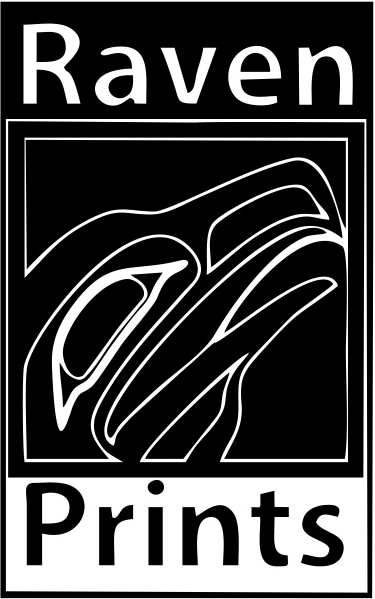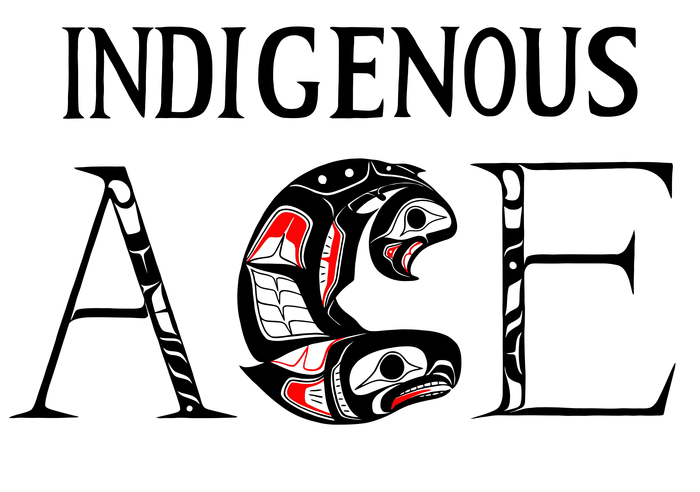Nikki Villeneuve
Raven Prints
NW-Graduate

“Raven Prints is a legacy for our family.”
Nikki Villeneuve is the owner of Raven Prints, a storefront business in Terrace, B.C. that provides a wide range of personalized and high-quality printing services. With Nikki’s expertise, customers can be assured that their design ideas can be professionally realized in a wide variety of products: apparel, mugs and ceramics, or print.
This successful Nisga’a/Gitxsan entrepreneur from Gitanyow is quick to credit those who have provided support in her entrepreneurial journey, from small home-based business operator to thriving retail storefront owner. The story of Raven Prints does not begin in the ACE program, but starts many years earlier in the culinary industry. At the time, Nikki and her husband ran a catering business, and had planned to return to that venture, but after her husband accepted a position as an industrial firefighter their plans shifted. In a move that Nikki credits to her husband Victor’s carpe diem outlook on life, they decided to purchase a screen printing machine. At the time, they had no screen printing experience and, as Nikki puts it, had to learn from “the school of Youtube”. With their newfound knowledge and a lot of hard work, they began to garner more and more local interest through Facebook, the Terrace Farmer’s Market, and contracts from local First Nations Organizations. For two years Nikki worked at her home-based business, slowly building her customer base and expanding her product line.
NW-ACE – A New Experience
It was at this point that
Nikki found out about the ACE program through a Facebook post shared by her
cousin Noah Guno, one of the earliest graduates of the program
and founder of the Indigenous micro-news website Aboriginal Press.
Noah strongly suggested that Nikki would benefit from the training and
experiences that the NW-ACE program provide. This led Nikki to explore her
options and soon after she entered the EAGLE™ program, and says that “it was a
great introduction to ACE”. The Empowering Aboriginal Generation of Leaders and Entrepreneurs
Program delivers face-to-face training over several days that
explores opportunities in employment and entrepreneurship. The students who
feel strongly inclined towards running their own business are then invited to
apply to their regional ACE program. Nikki says that “it was an eye-opening
experience” that showed her that passion and vision had to be tempered with
reason if a business was to succeed.
All ACE students have
varying degrees of business experience prior to their entry into the program.
Some, like Nikki, have prior business experience and may already have
expectations of the program. The goals she identified on entry into ACE, such
as financial education, bookkeeping, and business fundamentals, were improved
over her time in the program. Nikki also found that new goals emerged through
ACE, as she was exposed to fresh ideas and the experience and instruction of
the faculty. Experiences like the 3C Challenge, taught her that there is always
“a compromise to be made.”
The 3C Challenge – a long time tradition of the ACE Program – is all about student entrepreneurs learning to deal with the tension inherent in Indigenous business ownership of balancing cash, community and culture. The challenge runs for 30 days during the ACE course. Within the challenge, each ACE cohort is divided into groups of 4 and provided a micro-loan of $1000. The student groups are then tasked with creating a business to generate as much value as they can, using that micro-loan, in the 30-day period. They can choose to focus on generating as much cash, community value or cultural value (or a combination of all three elements) in any way they choose. In the past student groups have put on community events, created traditional recipe books, and even developed and sold products in the month-long challenge. At the end of the 30 days, students are asked to return the micro-loan of $1000; the student groups each then can either choose to keep profits made beyond the initial loan (and split the profits among the 4 members) or they can choose to donate the money to a local charity or Community. (Jordan Hrenyk)
In the case of Nikki’s
business, the compromise she needed to consider was between the lower overhead
of a home-based business, and the legitimacy, exposure, and tourism
accessibility of a centralized retail business. Though she strongly held on to
her initial vision of an expanded home-based business, with time she saw the
possibilities of an established storefront. In the last months of the program
Nikki says she had “revisited and changed everything”, and by the end of the
program she had decided that a storefront was a realistic and worthwhile goal.
Nikki says that the 3C challenge was her favourite part of the program. She says that even though it was “stressful”, it showed her the value of teamwork, gave her confidence, and the realization that she could work in high-pressure situations. For the 3C challenge, Nikki’s team produced Keep Our Skeena Sacred! screen-printed ecobags, and the donations from the sales of the bags went to the Skeena Wild Conservation Trust and the Parkside Secondary School Grad Committee.
Entering the first NW-ACE
Terrace cohort, Nikki says that she had no idea that her peers in the program
would come to feel like “an extended family”. In fact, she says that the
ongoing relationships with her NW-ACE family have been an ongoing source of
support. Nikki also credits the ACE instructors, mentioning that they were
“[very] encouraging” and that their guidance was particularly valuable in
sharing methods in which the knowledge gained in the program could be applied,
especially in areas such as social media, branding, and handling the financials
of a small business.
One of the strengths of the ACE program is that the
graduates go on to become entrepreneurial mentors in their own right, and Nikki
credits her cousin Noah Guno as one such mentor. Not only did he convince her
that the program was a worthwhile undertaking, but he also was ready to listen
and offer advice about how to complete projects, or how to navigate the
difficulties of managing a family while being a full-time student.
Raven Prints finds a new home and takes flight
 Raven Prints, the name of
Nikki’s business, arose out of her involvement with the now defunct Aboriginal
Mentoring and Training Association. The name was suggested while she was
involved with the AMTA, and seems appropriate as Nikki indicates that she is “Nass
Raven”. Her cousin Noah Guno helped design the logo, and was given permission
by Vancouver artist Alano Edzerza to base it on a pre-existing design.
Raven Prints, the name of
Nikki’s business, arose out of her involvement with the now defunct Aboriginal
Mentoring and Training Association. The name was suggested while she was
involved with the AMTA, and seems appropriate as Nikki indicates that she is “Nass
Raven”. Her cousin Noah Guno helped design the logo, and was given permission
by Vancouver artist Alano Edzerza to base it on a pre-existing design.
As Nikki describes it, the
decision on the store location happened on a winter walk with her family on
Lakelse Avenue, Terrace’s main street. Nikki and Victor saw an empty storefront
in an ideal location, and they happened to know the owner who was a long-time
Terrace entrepreneur. They decided it might be worthwhile to discuss the
location and the possibility of a lease. Nikki says that at that time it was
winter she was thinking it might be better to wait to sign a lease in the
spring, to which the owner replied, “Spring? It’s already spring”. This succinct
statement about the need of a retail businessperson to be always thinking ahead
made sense to Nikki, and she agreed lease the storefront. When asked about the
decision to move forward with the storefront, Nikki notes that “it has been
great. All of the surrounding businesses have been like family. They have been
helpful, and have offered advice and support when needed”. Nikki also credits
the continual support of NW-ACE Program Manager Cory Stephens: “Cory helped and
assisted us constantly. He was always available to lend a hand.”
 Nikki and her husband
renovated the storefront, with the help of her sister and brother-in-law, while
still running their business out of their home. They had a considerable amount
of stock ready, but more was needed, and their kitchen and living room were
overflowing. Nikki still had to acquire insurance and complete her business
plan, and deal with her most troublesome detail: the cash register. The one
thing Nikki says she wishes she had on hand prior to opening was a simple checklist
of items. Funnily enough, she found one after she had successfully navigated
the process without it – a testament to her resourcefulness and the capacity of
NW-ACE entrepreneurs. One thing Nikki says she might have done differently: “I
would have completed my business plan long before setting up the storefront. It
was a lot of work.”
Nikki and her husband
renovated the storefront, with the help of her sister and brother-in-law, while
still running their business out of their home. They had a considerable amount
of stock ready, but more was needed, and their kitchen and living room were
overflowing. Nikki still had to acquire insurance and complete her business
plan, and deal with her most troublesome detail: the cash register. The one
thing Nikki says she wishes she had on hand prior to opening was a simple checklist
of items. Funnily enough, she found one after she had successfully navigated
the process without it – a testament to her resourcefulness and the capacity of
NW-ACE entrepreneurs. One thing Nikki says she might have done differently: “I
would have completed my business plan long before setting up the storefront. It
was a lot of work.”
The support from the local community has been considerable. Raven Prints has a large collection of regular customers, over 1000 Facebook followers, and many other organizations placing large orders, such as Gitxsan Child and Family Services. Nikki has also received additional support from the Nisga’a Business Development Fund.
Advice to future
ACE entrepreneurs
Now that Raven Prints is opened and operating, Nikki says that the reality of running a full-time retail storefront has been eye-opening. She works six days a week, sometimes
 until “10:30 at night”, but Nikki says that “it has been worth it.” She offers some advice to current and future ACE graduates: “Believe in your vision. Don’t listen to those who don’t understand what an entrepreneur is, or does. Believe in your fellow ACE students, and support them and their vision. They are like an extended family, and only they know what you are going through.”
until “10:30 at night”, but Nikki says that “it has been worth it.” She offers some advice to current and future ACE graduates: “Believe in your vision. Don’t listen to those who don’t understand what an entrepreneur is, or does. Believe in your fellow ACE students, and support them and their vision. They are like an extended family, and only they know what you are going through.”When asked about her future, Nikki expresses a desire to
upgrade her screen printing press to allow for quicker production. One of her
primary services is customized, one-off, personalized items. With upgraded
equipment, she would be able to produce items for customers with a much quicker
turn-around. She also looks forward to the day when Raven Prints is
busy enough that her husband will be free to come work with her on a full-time
basis.
We here at ACE are grateful to have had the opportunity to work with Nikki Villeneuve, and to learn from her experiences and her vision for the community. If you would like to contact Nikki, or have any business enquiries for Raven Prints, please check out their Facebook page, email, or call (250) 635-4433.

